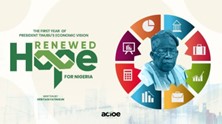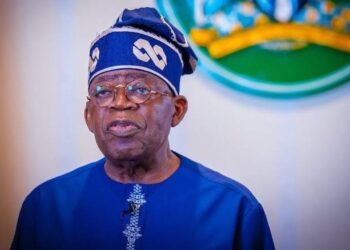A new book chronicling the life and achievements of President Bola Ahmed Tinubu has been described as an inspiring narrative of leadership, resilience, and vision. The book, titled “The Architect of Renewal: The Bola Ahmed Tinubu Story,” was presented to the public during a recent event.
Special Adviser to the President on Media and Public Communication, Mr. Sunday Dare, praised the book for its insightful portrayal of Tinubu’s journey and its relevance to the challenges currently facing Nigeria. “It is a deliberate presentation of a rich background to an era that is just beginning,” Dare said.
The book explores Tinubu’s rise from grassroots activism to the Presidency, emphasizing his meticulous preparation for leadership. It recounts his early involvement in democratic struggles under NADECO, his time in exile, and his tenure as a transformative governor of Lagos State.
According to the authors, Tinubu’s leadership journey was no accident but the result of years of strategic planning and determination. “Tinubu’s journey to the presidency was not a sudden one. It is a product of accumulated efforts, sleepless nights, a life in exile, and an undying vision,” the book asserts.
The authors highlight Tinubu’s significant achievements as governor, including increasing Lagos State’s internally generated revenue from ₦600 million to over ₦5 billion per month. They credit these accomplishments to his innovative policies and strategic vision, describing them as “uncommon by every standard.”
The book also delves into Tinubu’s grassroots mobilization strategies and his exceptional ability to build coalitions across ethnic and political divides. His political acumen, the authors argue, has earned him recognition as the “foremost face and driver of progressive politics in Nigeria since the death of Chief Obafemi Awolowo.”
Tinubu’s ability to foster alliances and engage with the masses is attributed to his deep understanding of Nigeria’s political landscape, a skill nurtured by his mother, Alhaja Abibatu Mogaji, the Iyaloja-General of Lagos State.
Dare commended the book’s exploration of Tinubu’s leadership qualities, describing him as a bold, forward-thinking leader unafraid of making tough decisions. “True leadership is not for the faint-hearted. It requires the capacity to take a studious look at available options and choose the path that leads to the general and enduring good, not necessarily one with the least resistance,” Dare quoted.
The book’s final chapters provide a vision of hope, emphasizing Tinubu’s plans for infrastructure development, educational reform, healthcare improvements, and job creation. Drawing on his successes in Lagos, the authors express confidence that Tinubu’s administration will replicate these achievements on a national scale.
His manifesto, aimed at creating 50 million jobs and improving living standards, is presented as evidence of his dedication to a prosperous Nigeria. “This book rekindles the confidence of Nigerians in their President as a man well-equipped for the job,” Dare concluded.
With its ten concise chapters, “The Architect of Renewal” is not just a biography but a reassurance to Nigerians of the President’s ability to deliver on his promises. As Dare put it, “Our hope is renewed that a greater Nigeria is possible under President Bola Tinubu.”


































